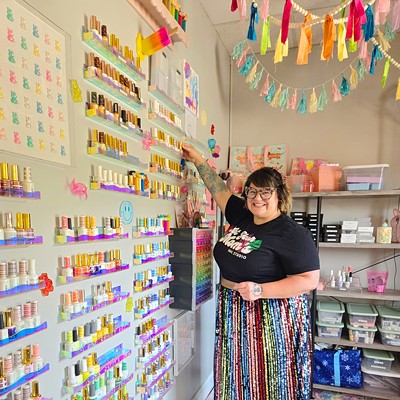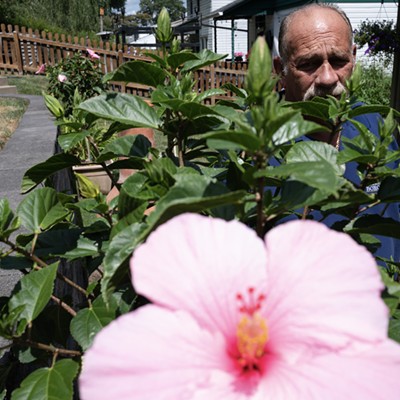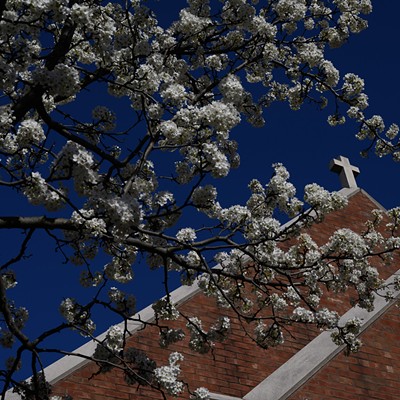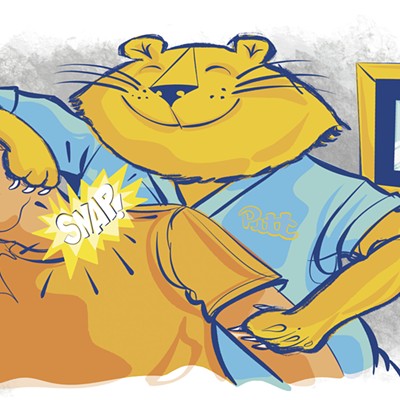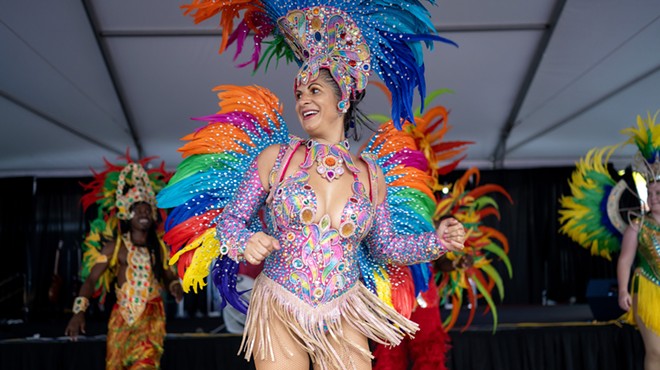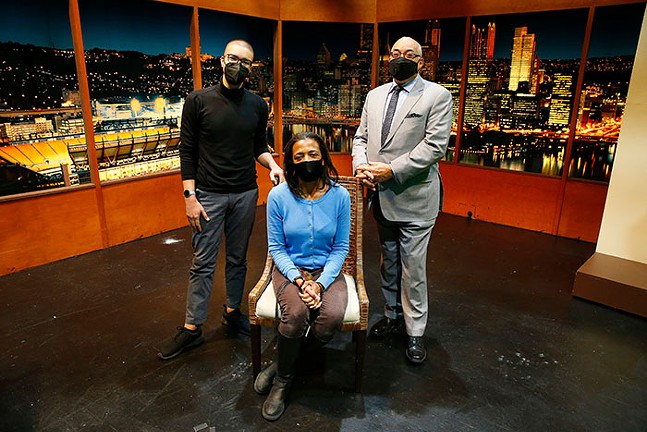
CP Photo: Jared Wickerham
WQED Digital Producer Willy James, WQED Senior Producer Minette Seate, and former Black Horizons host Chris Moore in the WQED Studios
Several years later, Harris and his family sued the street vendor and claimed the Harris estate was entitled to one-third of all profits from sales and exhibition of his work. In 2001, a few years after Harris passed away in 1998, the estate won that suit, and the collection was back in control of the Harris family.
Part of the success of that lawsuit was Harris’ 1997 appearance on the long-running WQED public affairs show Black Horizons. Chris Moore, who hosted Black Horizons for more than three decades, says that he was told by sources close to Harris that the Black Horizons episode was used as evidence and played a part in winning the lawsuit.
This is just one example of the impact Black Horizons had on Pittsburgh and beyond. The public affairs show ran for more than four decades, leaving the air in the early 2010s, and was the longest running Black public affairs show in America.
As Black History Month kicks off, Pittsburgh City Paper believes there’s never been a better time for Pittsburghers to rediscover Black Horizons. The show’s importance to the city is likely not fully explored, much like many aspects of Pittsburgh’s Black history. The region has often failed to archive official documents, and some local media companies have been reluctant to dive deep into the Black Pittsburgh experience. From interviews with the man who was supposed to become the world’s first Black astronaut, to documentaries confronting racism throughout Pennsylvania, to highlighting local dance troupes and music groups, Black Horizons’ hundreds of episodes can help Pittsburgh discover aspects of its history that is likely unknown to many.
Most of the analogue archives of the show are still available and stored at WQED. Moore believes the archives have historic value, and there is a demand in the community to allow for easier access to them, perhaps even converting many of them to digital. Moore says he often has people contacting him, curious about appearances their family members had on the show.
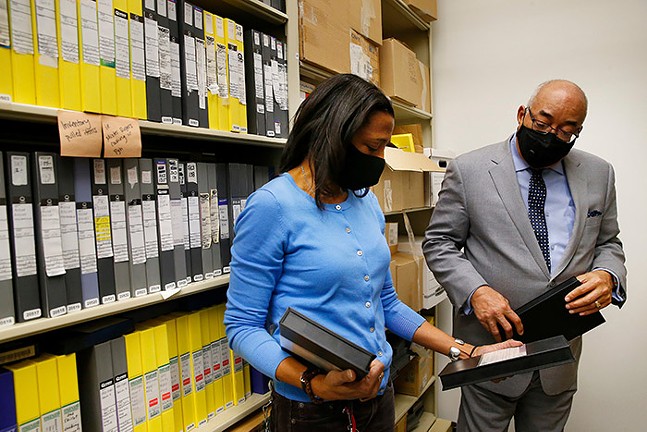
CP Photo: Jared Wickerham
Minette Seate and Chris Moore look at archived tapes inside the WQED tape vault room.
Black Horizons started in 1968, shortly after the assassination of Martin Luther King, Jr. Protests and riots filled cities throughout the nation, including Pittsburgh, and many television stations knew they had to respond. Thus began a slew of public affairs and news shows dedicated to the Black experience in the U.S., and Black Horizons was the country’s first.
Moore says that beginning shaped Black Horizons, with advocates speaking truth to power, and artistic acts that strongly represented Black culture.
“The program was really militant in its early days,” says Moore. “And they had a real artistic bent too, from quilting to jazz music and other things. … I think that it was always a force in the community. That’s probably why it was so militant because no one had had their voices heard.”
Moore took over as host and producer in 1980. He says the show started to expand to cover things directly happening in the Black community. That meant taking heavy cameras to neighborhoods like Homewood that usually didn’t get a ton of coverage, speaking to imans at mosques, or to Black state representatives.
It went beyond Pittsburgh, too. Black Horizons interviewed Ed Dwight, an air force pilot who was set to become the nation’s first Black astronaut, only to be controversially denied years later. Moore also interviewed Calypso legend, actor, and activist Harry Belafonte.
Moore says Black Horizons provided documentation of important events not covered by traditional media at the time, including labor movements of Black service and construction workers that were ongoing in the late 1960s and 1970s.
He adds that getting the show to air wasn’t always easy. Stories about the Black experience in Pittsburgh and Pennsylvania, especially when Black Horizons sought to make documentaries, didn’t always get support from higher ups.
Moore says this is all the more reason for people to rediscover and appreciate the work of Black Horizons.
Eventually, the show became a place where many Black people could get coverage, and where people could see Black Pittsburghers adequately represented.
But even that hyper-local focus included some likely historical footage. Moore says one Black Horizons appearance apparently waiting to be uncovered is of a young Billy Porter performing on the show when he was a student at Pittsburgh CAPA. Porter is now a Broadway star, TV actor, and is quickly becoming a fashion icon for his standout appearances on the red carpet.
Moore, who now hosts a radio show on KDKA Radio, says this is likely one of many potential hidden treasures of the Black Horizons archives.
Moore says digitizing the archives could even provide a revenue-generating opportunity for WQED, which he would welcome since Black Horizons ran for years without generating revenue and stayed around thanks to underwriters.
“I still get calls from a younger generation, they learn about it when WQED reruns the programs,” says Moore, noting that documentaries Black Horizons produced like Wylie Avenue Days and Jim Crow Pennsylvania are still shown on WQED from time to time. “I guess the episodes do have historical value. If they were able to catalogue it, and people who were on it, they would rush to buy that video.”
WQED senior producer Minette Seate started on Black Horizons in 1990, initially doing movie reviews. She eventually became a series producer. Seate says shows like Black Horizons were often the only way that coverage of the Black community made it into local media.
“I think that Pittsburgh should remember Black Horizons because it was special,” says Seate. “There were a lot of things going on that wouldn’t make it into the Pittsburgh press.”
Although Black Horizons went off the air in 2010, and Pittsburgh is down to just one Black-focused public affairs television show (the Lynne Hayes-Freeland show on KDKA-TV), Seate says the atmosphere for public affairs shows focusing on representing people of color is different today than it was when Black Horizons was on. Seate says that large, even national news programs are more willing today to interview leaders in the Black community, and that even commercials and advertisements are doing a much better job at including people of color.
She says the representation has become more prominent since the Black Lives Matter demonstrations of last summer. Locally, she points to the rise of 1Hood Media as an organization that is blazing a path similar to what Black Horizons did, but in a digital format.
“1Hood Media has done an amazing job at responding to the Black Lives Matter movement,” says Seate. “And they have also taken a huge step in addressing COVID for the Black community.”
In its day, Black Horizons showcased a similar spirit. It was a show for the community and, largely, by the community. “No matter how small or big, there was always a space for you on Black Horizons,” says Seate.

CP Photo: Jared Wickerham
WQED Digital Producer Willy James, former Black Horizons host Chris Moore, and WQED Senior Producer Minette Seate in the WQED Studios
“It really is a cultural treasure for Pittsburgh,” says James. “I think we should celebrate all history and the things that are underspoken. Black Horizons is one of those things that Pittsburgh is not really discussing, and I would be super interested in seeing it explored more.”
James, a Pittsburgh native, admits that not every minute of the show’s archives is groundbreaking television. But he says the show can provide a boost of nostalgia for many, and his time watching some of the Black Horizons archives has shown him how Black Pittsburgh is still confronting the same problems.
“The most interesting things to me — beyond it highlighting important cultural spots, or different businesses — is how Black Horizons shows the problems of back then are the same dialogue as now,” says James. “Back then, they were talking about Black women not getting proper health care, and gun violence, and how we need more Black entrepreneurs. We are still talking about those issues.”



